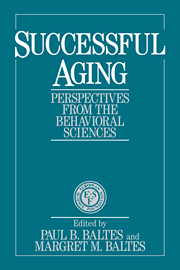Book contents
- Frontmatter
- Contents
- List of contributors
- Foreword
- Preface
- 1 Psychological perspectives on successful aging: The model of selective optimization with compensation
- 2 Medical perspectives upon successful aging
- 3 Successful aging in a post-retired society
- 4 The optimization of cognitive functioning in old age: Predictions based on cohort-sequential and longitudinal data
- 5 The optimization of episodic remembering in old age
- 6 Peak performance and age: An examination of peak performance in sports
- 7 Personal control over development and quality of life perspectives in adulthood
- 8 Successful mastery of bereavement and widowhood: A life-course perspective
- 9 The Bonn Longitudinal Study of Aging: Coping, life adjustment, and life satisfaction
- 10 Risk and protective factors in the transition to young adulthood
- 11 Avoiding negative life outcomes: Evidence from a forty-five year study
- 12 Developmental behavioral genetics and successful aging
- Name index
- Subject index
1 - Psychological perspectives on successful aging: The model of selective optimization with compensation
Published online by Cambridge University Press: 22 March 2010
- Frontmatter
- Contents
- List of contributors
- Foreword
- Preface
- 1 Psychological perspectives on successful aging: The model of selective optimization with compensation
- 2 Medical perspectives upon successful aging
- 3 Successful aging in a post-retired society
- 4 The optimization of cognitive functioning in old age: Predictions based on cohort-sequential and longitudinal data
- 5 The optimization of episodic remembering in old age
- 6 Peak performance and age: An examination of peak performance in sports
- 7 Personal control over development and quality of life perspectives in adulthood
- 8 Successful mastery of bereavement and widowhood: A life-course perspective
- 9 The Bonn Longitudinal Study of Aging: Coping, life adjustment, and life satisfaction
- 10 Risk and protective factors in the transition to young adulthood
- 11 Avoiding negative life outcomes: Evidence from a forty-five year study
- 12 Developmental behavioral genetics and successful aging
- Name index
- Subject index
Summary
The purpose of this chapter is twofold. First, we review research on the nature of psychological aging in terms of seven propositions. Second, we present a psychological model for the study of successful aging that, we contend, is consistent with the propositional framework. The approach advanced is based on the premise that successful, individual development (including aging) is a process involving three components: selection, optimization, and compensation. How these components of adaption are realized depends on the specific personal and societal circumstances individuals face and produce as they age.
Introduction
Two scientific concepts have had a major impact on our thinking about successful aging: interindividual variability and intraindividual plasticity (M. Baltes & P. Baltes, 1982; P. Baltes & M. Baltes, 1980; P. Baltes & Schaie, 1976). Reflection on the theoretical and policy-related implications of both concepts has suggested to us that there is much opportunity for the continual optimization of human development (see also Brim & Kagan, 1980; Labouvie-Vief, 1981; Lerner, 1984). Over the years, we have begun to believe that systematic age-related shifts in the extent of variability and plasticity are cornerstones for a developmental theory of human adaptation. Initial evidence for this perspective is available in our first attempt to formulate an agenda for successful aging (P. Baltes & M. Baltes, 1980). After reviewing research on variability and plasticity, we laid the groundwork for a prototheory of successful aging as an adaptive process involving the components of selection, optimization, and compensation.
- Type
- Chapter
- Information
- Successful AgingPerspectives from the Behavioral Sciences, pp. 1 - 34Publisher: Cambridge University PressPrint publication year: 1990
- 1452
- Cited by



